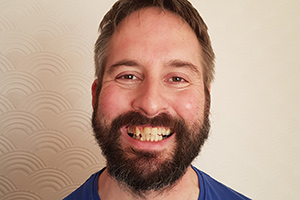
24 Hour Party People: Madchester at its height
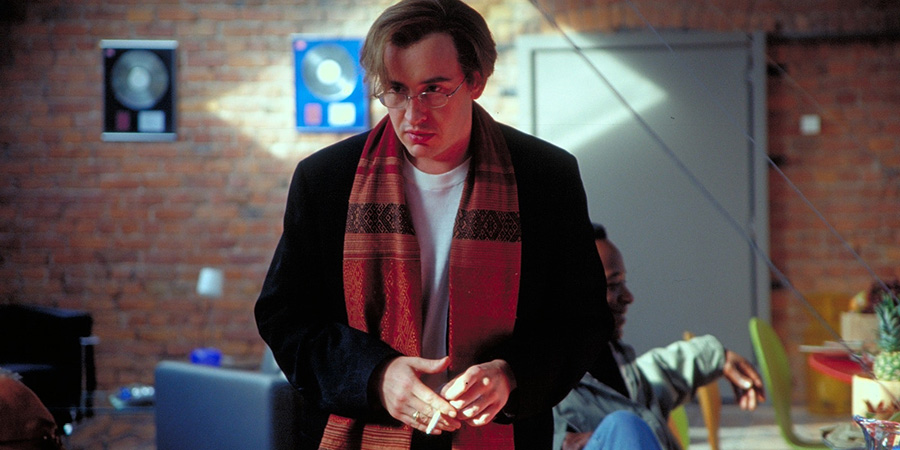
An alien space craft is sighted over the streets of Eighties Manchester. It hovers for a short while and then beams down Bez, later a member of the alternative rock band the Happy Mondays, who decides to set up home there. Meanwhile, two young men decide to dip some bread in rat poison before feeding it to the birds. Three thousand pigeons die as a result. Elsewhere, God Himself appears to record producer Tony Wilson in a vision and reassures him about his career choices. He concedes that it's a shame he couldn't get The Smiths on board, but says he shouldn't worry about not having signed Simply Red.
All three of these fantastical incidents occur during the course of Michael Winterbottom's 2002 film, 24 Hour Party People. Yet the film itself is no fantasy. It is the real-life story of Tony Wilson, Factory Records, the bands, Joy Division, New Order, the Happy Mondays and the Hacienda nightclub. And, yes, while I'm not 100% sure if Bez really was ever beamed down to Earth by a UFO, or not, most of what follows really did happen. In short, he film is most definitely not (to reference the title of a later, Michael Winterbottom/Steve Coogan collaboration), a cock and bull story.
While it undoubtedly does have its serious moments, 24 Hour Party People also often happens to be very funny. The superb cast includes many of the greatest British comedy stars of the age. Even if you have no real interest or liking for any of the bands or music involved, the film can be wholeheartedly recommended on these grounds alone.
We first meet Wilson in 1976 where, as a correspondent for ITV north-western news programme Granada Reports, he takes part in an entertaining but extremely hazardous report that sees him hang-gliding across the Pennines. Wilson is played throughout by Steve Coogan, an undeniably superb casting decision.
Wilson's on-air hang-gliding flight quickly sees him crashing down to Earth: Coogan's commentary is mixed in with actual footage of Wilson's actual short journey from the time. Soon afterwards, however, Coogan/Wilson is talking to us directly again, no longer as part of the recreated Granada TV report but as a character in the film, breaking the fourth wall to address the audience directly. We quickly learn that Wilson is an educated man, but not one who wears his learning lightly as he hammers home his point about how the stunt symbolises Icarus's mythical flight.
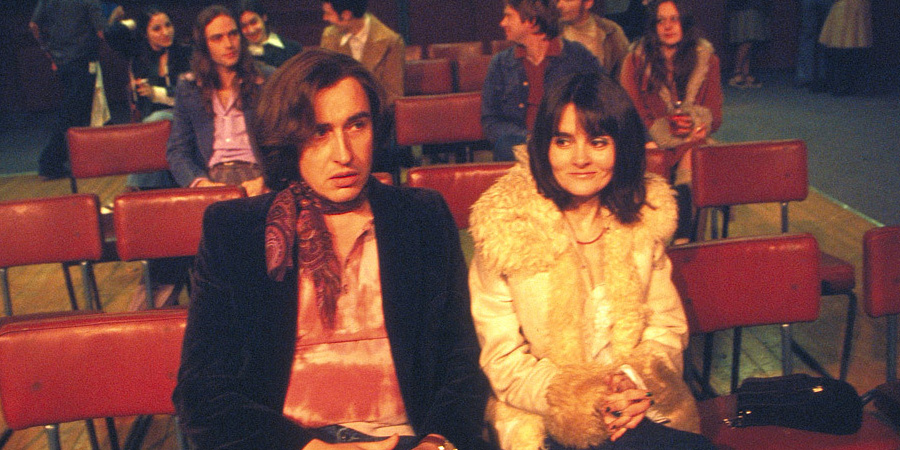
The tone of the film is thus quickly set. Coogan as Wilson will frequently break the fourth wall throughout, either to advance the film's narration to fill in any gaps in the narrative. "It's post-modernism before it was fashionable," as Wilson explains later in the film. Somehow this technique proves to be far less annoying than you might expect.
This is partly because the technique proves very helpful in disseminating the film's rather unusual approach to fact and fiction. Early on, for example, we are treated to a scene in which Wilson is shown cavorting with two women who would now be described as sex workers in the back of a fur-lined camper van. On interrupting him in the act, his wife, Lindsey (Shirley Henderson) proceeds to retaliate by initiating a sexual encounter with another man, Howard Devoto, of the band The Buzzcocks (played by Martin Hancock), in the club toilets. (This sex scene, incidentally, narrowly predates Henderson's later and more famous role, in which she could also be seen moaning in a toilet, as Myrtle in the Harry Potter films.)
Anyway, Coogan's Wilson then proceeds to interrupt this sex act to awkwardly borrow the car keys and in a wonderful act of Partridge-esque pedantry points out that she is not committing adultery on equal terms ("I only got a blow job. That's full penetration.") before leaving, saying "hello Howard" to a passing cleaner on the way out. The cleaner then exclaims, "I don't remember any of this happening." For as Coogan/Wilson now reveals to the audience, the cleaner is in fact played by the real onetime Buzzcock, Howard Devoto. He furthermore reveals that none of the recent events we have just seen - including the sex between him and Wilson's wife, nor Wilson's own antics with the two sex workers in the van - ever really happened. Coogan/Wilson then concludes by summarising what is presumably director Michael Winterbottom's attitude to truth and fiction in this film with a quote attributed to legendary westerns director John Ford: "When you have to choose between the truth and the legend, choose the legend."
As a matter of fact, it is doubtful this phrase really originates with John Ford anyway. It seems to have been first used in the western The Man Who Shot Liberty Valance (1962), which Ford certainly directed but didn't write. But this probably isn't important. Ultimately, 24 Hour Party People could have just as easily begun with a quotation from another famous 1960s western, Butch Cassidy And The Sundance Kid: "Not that it matters, but most of what follows is true."
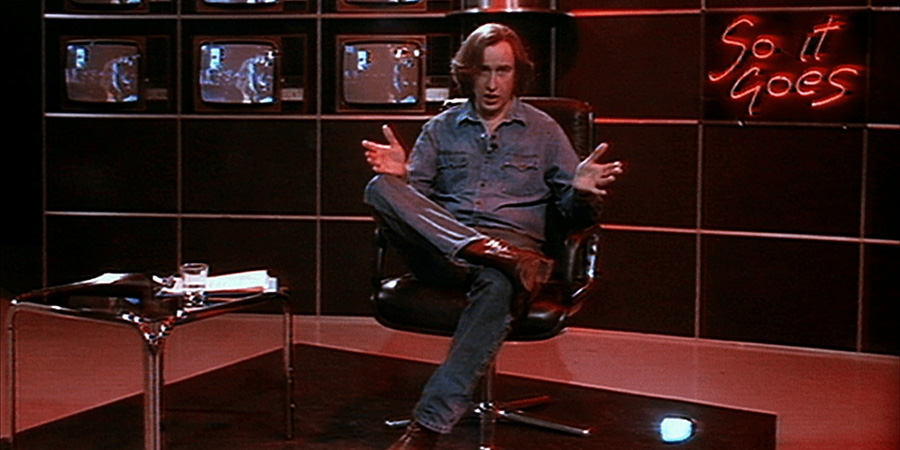
We soon learn that in addition to his Granada Reports day job, Wilson has a passion for music. He exploits his talent for finding the latest interesting new sounds on a late-night show called So It Goes. It is here that Wilson, who at this point was effectively serving a similar function on TV to that fulfilled by John Peel on the radio as a champion of new musical talent, first introduces the audience to the Sex Pistols. We see Coogan/Wilson awkwardly pogoing to the punk legends at a famously sparsely-attended but nevertheless historic early performance in Manchester. Unlike many of the bands in the film, whose performances are recreated by actors, the Sex Pistols mostly only appear in archive footage. Although we should be grateful that their music is used at all: the music of The Smiths (who the real Tony Wilson apparently fell out with) and Simply Red is not, although neither of these create much of a problem as they are not really in the story much.
New Order member Peter Hook described the casting of Steve Coogan as Tony Wilson in the film as "the biggest c**** in Manchester being played by the second biggest". In fact, it's not necessary to dislike either man to believe the casting here is perfect. Not only is Coogan from the same part of the world as Wilson (he even once performed as a stand-up at Wilson's legendary club, The Hacienda) but proved adept at adopting Wilson's look and distinctive, slightly droning speaking style. By playing someone who was also employed as a local news reporter for much of his career, Coogan also tackles the potential millstone of his own very strong association in the public mind with the character of Alan Partridge head-on. Wilson is, in truth, in the film a similar character to Partridge; and Coogan in fact cites him as an influence on the creation of the character.
The real Wilson, though, was more intelligent (he was Cambridge-educated), more ideologically driven and, in the film, more pretentious. He once describes his own Factory Records as not "actually a company" but "an experiment in human nature". The real Wilson appears briefly as himself in the film attacking his own screen persona for a hilariously high-brow attempt to host the decidedly low-brow ITV quiz show, Wheel Of Fortune ("it's my belief that history is a wheel," Coogan's Wilson drones on, "inconstancy is my very essence," says the wheel. "Rise up on my spokes if you like, but don't complain when you're cast back down into the depths. Good times pass away, but then so do the bad. Mutability is our tragedy, but it's also our hope. The worst of times, like the best, are always passing away").
However, as Wilson himself says, "I am a minor character in my own story". 24 Hour Party People is teeming with unusual and eccentric characters brought to life by an eclectic and talented cast. Now better known for playing bearded Mission Impossible villains, Sean Harris makes a real impact with his portrayal of Joy Division's intense, troubled frontman, Ian Curtis. Curtis was later portrayed by Sam Riley in the 2007 film Control (in which Craig Parkinson took on the role of Tony Wilson). Both performances are great and it is worth comparing the two. Both films also tackle Curtis's 1980 suicide directly.
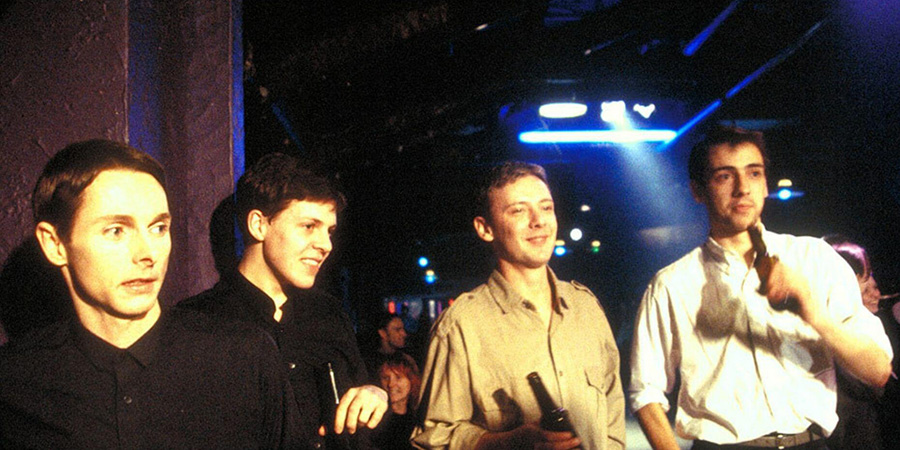
John Simm plays Curtis's band mate and New Order co-founder Bernard Sumner. Although yet to appear in his most famous role as the time-travelling Sam Tyler in Life On Mars, Simm already had something of a cult following from films such as Human Traffic and Michael Winterbottom's Wonderland as well as TV appearances in Spaced, The Lakes and Clocking Off. He also had a band of his own at the time called Magic Alex, although they split when his career started really taking off.
Although she is not in 24 Hour Party People at all, comedy legend Caroline Aherne forges something of a link between the musical world of the film and the comedy scene of the early 21st Century to which so many of the cast belonged. Between 1994 and 1997, Aherne was married to the aforementioned Joy Division and New Order co-founder Hook. As "Hooky and the band", he even played a part in the first series of The Mrs. Merton Show. Coogan and John Thomson, who also appears in the film, had both worked with Aherne before (Thomson, memorably, as her henpecked screen husband, amongst other things, in The Fast Show). Hook's role is taken by a youthful Ralf Little, then still best known for playing Aherne's younger brother, Antony, in The Royle Family.
Another colourful character brought vividly to life is producer Martin Hannett, reportedly a "genius" and a man "too big for death" who is played by an almost unrecognisable Andy Serkis, then at the height of his Lord Of The Rings fame. Then a rising star, Paddy Considine is also memorable as the volatile co-founder of The Hacienda Rob Gretton, while Lennie James plays Factory co-founder Alan Erasmus. Kieran O'Brien, once the star of Eighties children's series Gruey and Gruey Twoey appears as Nathan, the manager of the Happy Mondays. The Mondays themselves are given just the right hint of menace by Danny Cunningham (as Shaun Ryder), Paul Popplewell (his brother, Paul) and Chris Coghill (Bez). And yes, the Ryder brothers really did kill three thousand pigeons. The stunt, which occurred in their pre-Mondays days, got them arrested.
Some surprising big names appear briefly in virtual cameos. John Thomson (a frequent Coogan collaborator in the Nineties) appears briefly as a composite character based on several of Wilson's long-suffering Granada TV producers. Another early Coogan co-star, Simon Pegg (then enjoying the interim between the end of Spaced and the release of Shaun Of The Dead) crops up as a music journalist. Future national treasure Peter Kay, then just finishing Phoenix Nights, appears as Don Tonay, a man who - unlike Kay himself - despises the medium of television. Future Doctor Who lead Christopher Eccleston (the star of Michael Winterbottom's early film, Jude) makes an easily-missed appearance as a down-and-out. And Dave Gorman appears as postman/punk singer, John the Postman. The film is further littered with a smattering of cameos from real-life survivors of the "Madchester" scene such as Rowetta (playing herself as a member of the Happy Mondays), Paul Ryder, onetime Inspiral Carpet, Cliff Boon Stone Rose, Gary 'Mani' Mounfield, Mark E. Smith of The Fall, and a number of one-time musicians ad DJs including Vini Reilly, Dave Haslam, Jon DaSilva, Mike Pickering and Steve Coogan's brother, onetime Mock Turtle, Martin Coogan. (No, I didn't know all of these either.)
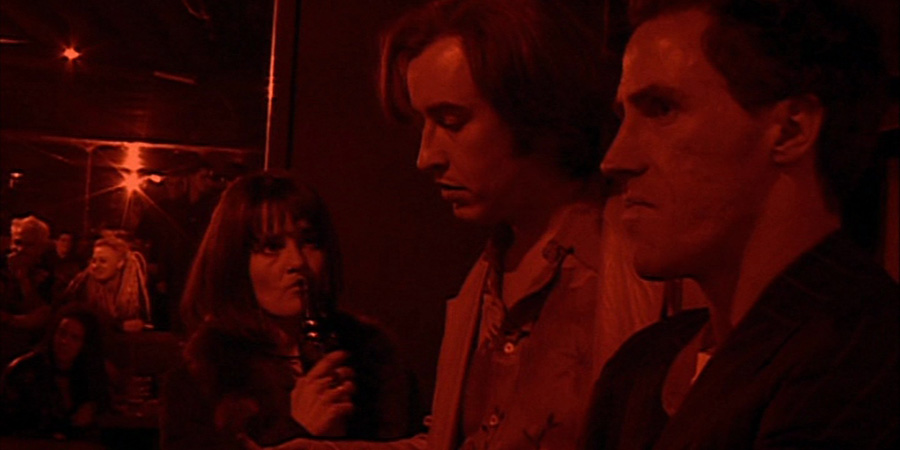
A final name worth mentioning from the cast list is that of Rob Brydon, who appears several times as an unsympathetic reporter. Brydon was still not yet a household name in 2002, but thanks to the likes of Human Remains and Marion And Geoff, was clearly on the rise and was starting to appear with Coogan (who had been a TV star since Alan Partridge's arrival in the mid-Nineties) more and more often. In 2005, they would appear again as versions of themselves in Winterbottom's A Cock And Bull Story. The duo's various onscreen improvisations and Al Pacino impressions in that film led directly to the four series of The Trip between 2010 and 2020, directed again by Winterbottom were and re-edited into successful feature films for the US market. Coogan also worked with Winterbottom again, perhaps less successfully, in The Look Of Love (2013) and Greed (2019).
Back in 2002, however, 24 Hour Party People marked Winterbottom's first brush with comedy success. Although a successful director since the mid-Nineties, his films up until that point (such as Jude, Welcome To Sarajevo and Wonderland) had tended to be on the sombre side and indeed, when not collaborating with Steve Coogan, this has generally also tended to be the case since (The Road To Guantanamo, The Shock Doctrine, This England). 24 Hour Party People was a success in Britain at the time and still ranks alongside Philomena and Stan & Ollie amongst Coogan's finest big screen performances. With no concessions at all to American audiences who might have been less familiar with the Happy Mondays or Granada Reports, however, the film made no real impact in the USA.
"Most of all, I love Manchester," Coogan's Wilson proclaims. "The crumbling warehouses, the railway arches, the cheap, abundant drugs. That's what did it in the end. Not the money, not the music, not even the guns. That is my heroic flaw: my excess of civic pride." In addition to being the story of Joy Division, New Order, the Happy Mondays, of Factory Records, a company whose existence was formalised by being written in blood, or the Hacienda, a nightclub which was popular but never made any money because most of its punters took ecstasy and drank water rather than buying drinks from the bar - it is fundamentally the story of Tony Wilson himself.
"My epitaph will be that I never, literally nor metaphorically, sold out," he says in the film. "I protected myself from ever having to have the dilemma of having to sell out, by having nothing to sell out." Sadly, the film now serves as something of a tribute to him, as he died aged just fifty-seven, five years after its release. Still a great watch, the soundtrack is also well worth seeking out. As God Himself (also played by Steve Coogan) proclaims in the film's final scene: "it's great music to chill out to".
Help us publish more great content by becoming a BCG Supporter. You'll be backing our mission to champion, celebrate and promote British comedy in all its forms: past, present and future.
We understand times are tough, but if you believe in the power of laughter we'd be honoured to have you join us. Advertising doesn't cover our costs, so every single donation matters and is put to good use. Thank you.
Love comedy? Find out more24 Hour Party People - Special Edition

The cult pop history movie released for the first time on Blu-ray, and re-issued on DVD, now with a massive 4.5 hours of bonus material.
A witty and compelling portrait of the 80s music scene following the rise and fall of Manchester's Factory Records label (Joy Division, New Order, Happy Mondays) from the birth of punk to '90s electronica.
First released: Monday 3rd June 2019
- Distributor: The Works
- Region: B
- Discs: 1
- Minutes: 117
![]() Buy and sell old and new items
Buy and sell old and new items
Search for this product on eBay
BCG may earn commission on sales generated through the links above.
- Distributor: The Works
- Region: 2
- Discs: 1
- Minutes: 112
![]() Buy and sell old and new items
Buy and sell old and new items
Search for this product on eBay
BCG may earn commission on sales generated through the links above.

